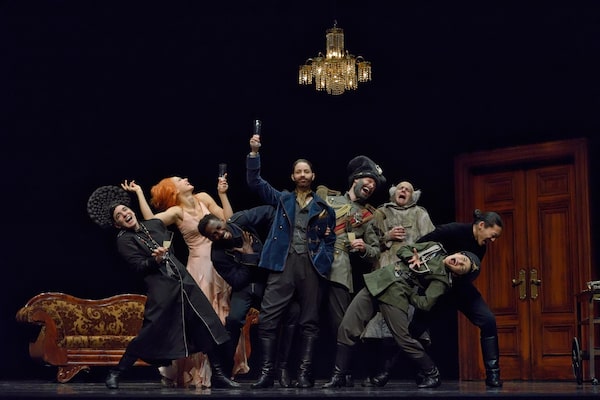
Renée Sigouin, Cindy Salgado, Rena Narumi, Tiffany Tregarthen, Matthew Peacock, Jermaine Spivey, David Raymond, and Doug Letheren in Revisor.Michael Slobodian/Supplied
- Title: Revisor
- Created by: Crystal Pite and Jonathon Young
- Genre: Dance/theatre
- Company: Kidd Pivot, presented by Canadian Stage
- Venue: Bluma Appel Theatre
- City: Toronto
- Year: To March 16, 2019

Doug Letheren in Revisor.Michael Slobodian
There are truisms about an artist’s sophomore effort – the creative work birthed in the shadow of a brilliant older sibling.
It follows that expectations couldn’t be much higher for Revisor, the second collaboration between Canadians Crystal Pite, Jonathon Young and the creative team that made the unforgettable Betroffenheit. It’s difficult to summarize the emotional impact of that production, which won an Olivier Award and slayed audiences around the world. Its acclaim was consistent and resounding.
Perhaps one of the most impressive feats of Betroffenheit was that it created its own theatrical language. The unthinkability of its subject matter – the death of Young’s teenage daughter and her cousins in a cabin fire and Young’s subsequent post-traumatic stress disorder – seemed to demand the engendering of something aesthetically new, and the production’s synthesis of recursive voiceover, choreography and aggressively evocative design felt innovative. It was as though the darkest corners of a man’s mind had been externalized to create an original form.
With Revisor, a retelling of Gogol’s 1836 play The Government Inspector, Pite and Young seem to repurpose that form rather than let the new material generate a fresh one. There’s nothing the slightest bit wrong with that in principle; in fact, a quality I admire in Pite’s choreography is its sense of signature, as though I can see her physicality printed, like a palimpsest, on her dancers’ bodies. The issue with Revisor is that there’s a disjointedness in its melding of story, text and movement, a too-strident effort in making all three cohere. It has the tendency to feel like an act of building, elaborating and collaging rather than one of exquisite distillation. And while it’s certainly beautifully designed, and showcases some excellent trademark Pite choreography, it lacks a narrative entry point that can make the story resonate emotionally or let its content sink into our hearts.

Ella Rothschild, Cindy Salgado, Jermaine Spivey, Tiffany Tregarthen, Doug Letheren, David Raymond, Rena Narumi, Matthew Peacock in Revisor.Michael Slobodian
The first half operates mostly like a play, in which the dancers act out dialogue spoken via voiceover by a cast of actors. The setting is a government complex in a Russian interior ministry where a group of outlandish and corrupt bureaucrats believe they’re hosting an important inspector. The comedy comes from the interplay between their caricaturized voices and their physical personas. It’s most compelling when it reaches levels of absurdity. In a red wig and silky slip, the director’s wife (Cindy Salgado/Amy Rutherford) has a seductive laugh that takes control of her whole body to the extent that the effect becomes grotesque.
The conceit works less well when the dancers merely literalize their lines with movement. There is so much dialogue – and it contains so much detail about systems, rules, ministries, protocol – that any attempt to understand what’s going on is self-defeating. Of course, this feels like a self-reflexive comment on the nonsense that is bureaucratic language, but it leaves an audience unsure of what content they’re meant to retain.
Insofar as the work has a protagonist it’s the character of the Revisor (Tiffany Tregarthen/Jonathon Young), who is initially held in the complex’s run-down underground chambers, before the debacle of mistaken identity ensues. He accepts bribes, drinks and cavorts with the director’s wife – he’s a not a character who can set up any narrative structure for redemption. Instead, truth is evinced in Revisor’s abstract middle section. Much like Betroffenheit’s nightmarish second half, this portion operates like an externalization of forces we cannot see – it’s a reification of fear, suffering and voicelessness. In it, we revisit scenes and sequences from the show’s first part, but it’s as though the fog of corruption has burned off, and we’re able to see with a kind of philosophical clarity.

Tiffany Tregarthen in Revisor.Michael Slobodian/Supplied
It’s here that we get some striking sequences of choreography – bodies are pliable, muscular and able to express unspeakable ideas. An ensemble construction has the eight dancers moving in unison, engendering a sense of anxiety and threat through a streamlined flow of steps that is offset, suddenly, by staccato details. Rena Narumi does some standout work that reveals her particular technical excellence. But the section never quite lands emotionally, partly because of the overdetermined nature of the narrated text that accompanies it. We’re told of systems that need redefining, clauses that need to be changed, subjects that need to be moved. Intellectually, we get the concept: People are trapped powerlessly inside increasingly abstract systems of their own creation. Emotionally, we’re not entirely invested.
Still, the production never fails to look good. Stylistically, it exists in the heightened realm of a Wes Anderson film, where textured and dramatic costumes (by Nancy Bryant) are set against Jay Gower Taylor’s poetic and economical sets. David Raymond gets a stunning solo under a flashing lamp, in which time seems to fast-forward because of sudden oscillations in the lighting (designed by Tom Visser). A pair of decorative antlers in part one reappears as an antlered-dancer in part two, who slinks on stage with oneiric symbolism. When the Revisor is sent off to a bedroom with “a view,” there’s a magisterial paned-window that rises to the rafters and evocatively suggests a world where truths are obscured by distorted perceptions, by shadow and glass.
As impressive as Revisor looks form a distance, though, it remains at a remove from our hearts, where Betroffenheit keeps an unshakeable residence.
Revisor continues at Toronto’s Bluma Appel Theatre until March 16.

David Raymond in Revisor.Michael Slobodian